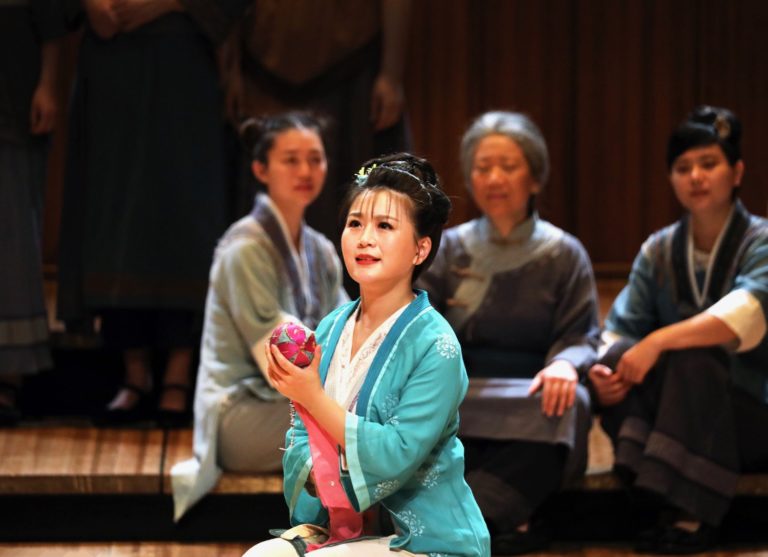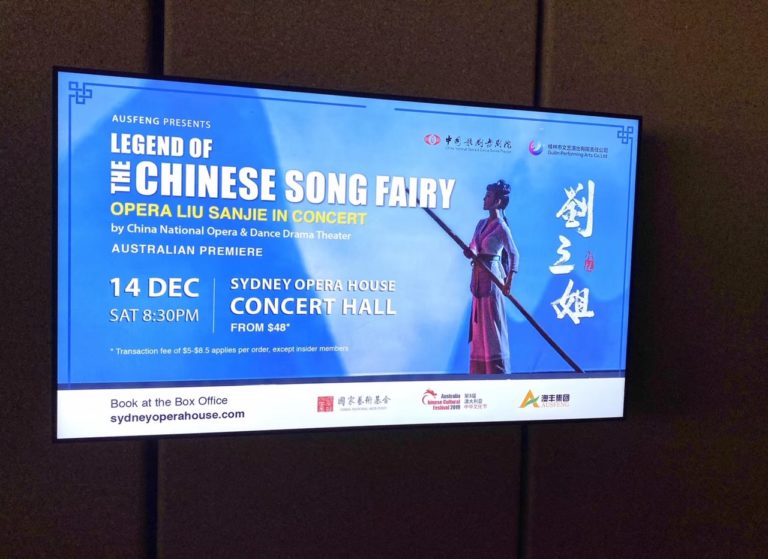Chinese opera at the Opera House

Liu Sanjie: Translating Chinese Opera
- Client: Ausfeng Event Productions
- Translation Deadline: Two weeks
- Translation Size: 100 minute opera
It is not every day that one gets to translate a Chinese Opera that is to be performed in the Sydney Opera House.
Here at mbChinese we were greatly honoured to be chosen by Ausfeng Event Productions to translate the Chinese opera Liu Sanjie: The Legend of the Chinese Song Fairy which was performed by the China National Opera & Dance Drama Theater at the Sydney Opera House and Melbourne Arts Centre in December 2019.
Liu Sanjie - The Chinese 'Sound of Music'
Originating from the folk stories of the Zhuang people in Guangxi province, Liu Sanjie tells the story of one courageous women, Liu Sanjie, who sings her way into the hearts of the people living along the picturesque Li River and has the nerve to stand up to the tyranny of the local landlord, Lord Mo.
Made famous through a 1961 musical video production, Liu Sanjie is sometimes referred to as the Chinese ‘Sound of Music’ for its wonderful singing and ongoing popularity.
Shot during a time when it was fashionable to pit the good peasants against the evil landlord, the film is pervaded with a passion, energy and hope that marked the early years of the People’s Republic.
Translation Challenges
The greatest challenge in translating Liu Sanjie was translating the mountain songs (known in Chinese as ‘shan’ge’) that are sung by Liu Sanjie and the other villagers.
Still popular among the Zhuang people today, mountain songs often involve short call and response verses that are witty, often pun, and almost always rhyme. Visitors to Guangxi province can still hear these mountain songs at ‘song fairs’ which are held throughout the year, and especially on the third day of the third lunar month.
Trying to keep the original flavour of the songs while retaining the rhymes involved being creative, using a thesaurus (our poor paperback Roget’s was pretty much worn thin by the time we were finished) and, most importantly, using a rhyming dictionary.
Here is a short example from a song duel between Liu Sanjie and one of Lord Mo’s lackeys, Graduate Bell:
Graduate Bell: One oil keg weighs 32 ounces.
The oil plus the keg at 2 pounds is counted.
If you can guess this riddle right,
I will have the oil to you by tonight.
Liu Sanjie: Your mother raised you to be such a good boy,
I guess she gave you an empty oil keg for a toy.
Why don’t you take it home and fill it up with wine,
Pour a cup when you thirst for the fruit of the vine.
Other challenges involved translating rhyming puns, Buddhist and Confucian cultural terms, as well as the ever so subtle use of sexual innuendo (Shakespeare provided much inspiration there).
Reception
In many cases, a translation is one of the least noticed parts of a production.
Compared to the stunning vocals of the two lead roles performed by Jiang Ning and Wu Pan or the skilful piano work of Duan Biyun, our translations were very much in the background.
Reviews of the production by Limelight magazine and The Age, while quoting lines from the translation, did not mention that the play was translated. It is likely that the reviewers probably weren’t even consciously aware that what they were watching was coming to them through the medium of translation.
Not being noticed is perhaps one of the best signs that the translation has been done well.
This may be hard on the translator’s ego, but it is the nature of the profession.
At least the translations were enjoyed by us here at mbChinese, as we watched the opera with half an eye always on the subtitles.
Watching one’s own translations live is a great way to get a feel for how the translations are experienced by an audience. It is also a great way of working out where one can improve.
In this case, as we watched the lines of texts flashing across the small subtitle screens, we realised that shorter lines are better when it comes to subtitling for live performances, especially in the action scenes.
Hopefully, this insight is something that we can bring to our next Chinese opera translation.

